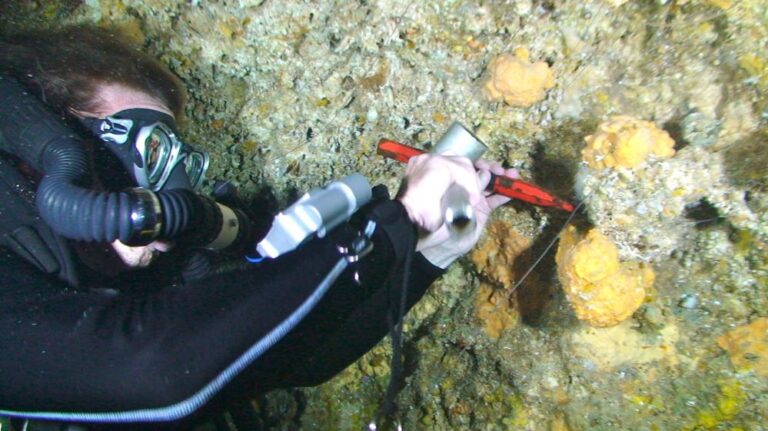Scuba divers have recovered deep-lying sponges containing data likely to escalate concerns about the rate of global-warming.
Scientific analysis of the skeletons of these long-lived sponges, retrieved from as deep as 90m, has revealed that the rate of global warming has already increased by 0.5°C more than had been previously estimated. If the team’s findings are generally accepted, they raise the present level from 1.2°C to 1.7°C.
The collaboration between researchers from the University of Western Australia (UWA), Indiana State University and University of Puerto Rico indicates that industrial-era warming was already underway by the mid-1860s. This is more than 70 years earlier than had been previously suggested by what the team regard as the unreliable recordings of sea-surface temperatures made from ships.
Technical divers from the University of Puerto Rico using closed-circuit rebreathers collected specimens of an ancient lineage of calcifying sponge, Ceratoporella nicholsoni, near the islands of Puerto Rico and St Croix in the Caribbean. Some of the sponges dated back as far as the early 1700s.
Sponges reflected eruptions
These coralline sclerosponges are found in the lower part of the Ocean Mixed Layer (OML), which is between 33 and 91m deep and is where heat is exchanged between the atmosphere and the ocean.
The deepest part of the OML tends to remain thermally inert, providing a more stable, representative record of upper surface ocean temperatures than the highly variable upper layer – and that thermal history is recorded by the sponges living in that low-light environment.

In the centuries over which the sponges can grow, they store strontium and calcium in a ratio that relates directly to the sea temperature of the time.
To illustrate their reliability, the scientists say they were able to detect in the sponge data a series of historic volcanic eruptions that occurred in Indonesia, Iceland, Nicaragua and elsewhere in the late 18th and early 19th centuries, causing sudden temperature drops.
According to the research, the combined average of surface ocean and land warming was under-estimated mainly during the 19th century, when recording temperatures from ships was still limited.
“So rather than the Intergovernmental Panel on Climate Change estimate of average global temperatures having increased by 1.2° by 2020, temperatures were in fact already 1.7° above pre-industrial levels,” said lead author of the study Emeritus Prof Malcolm McCulloch of UWA’s Oceans Graduate School.
‘Major challenge’
Last year was extreme in terms of weather events, with record-breaking global warming that, according to the new research, almost reached the 2°C limit specified in the Paris Agreement.
“If current rates of emissions continue, average global temperature will certainly pass 2° by the late 2020s and be more than 2.5° above pre-industrial levels by 2050,” says Prof McCulloch.
“Keeping global warming to no more than 2° is now the major challenge, making it even more urgent to halve emissions by early 2030, and certainly no later than 2040.” The sponge study is published in the journal Nature Climate Change.
Also on Divernet: Secret upwardly mobile life of sponges, Divers discover new purple & green sponges, First self-lit sponges identified, Sponges: Glue of the reef, Viruses bow to killer sponges

